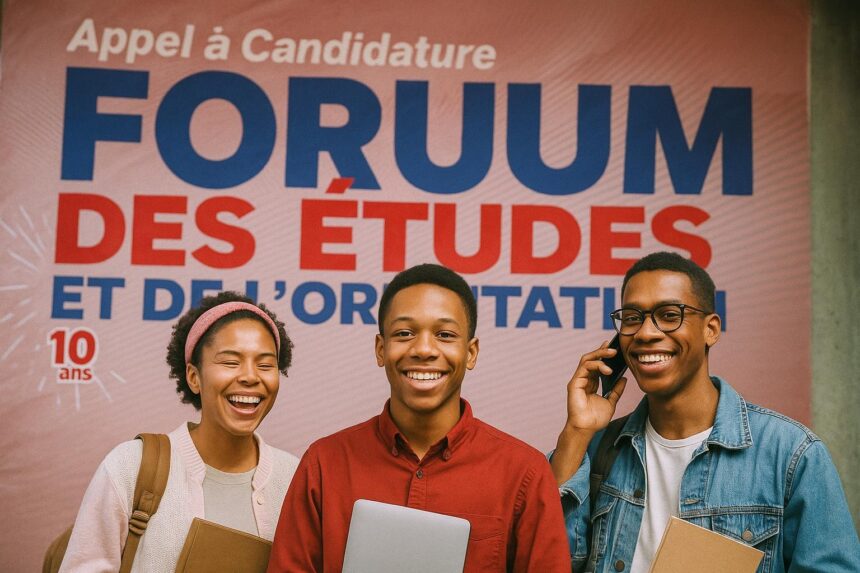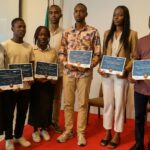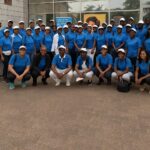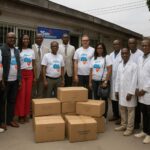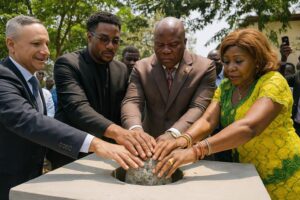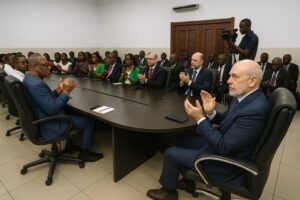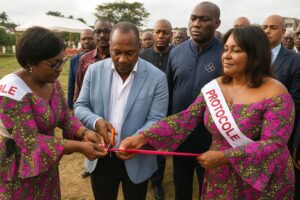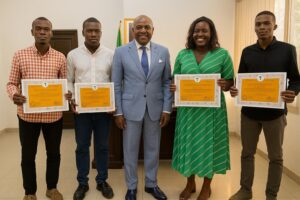A decade of advice for Congolese youth
October marks the tenth time Campus France Congo stages its Study & Orientation Forum, a free event designed to turn career questions into concrete plans. Organisers say the format, tested since 2014, mixes inspiration with step-by-step guidance for secondary-school leavers and undergraduates (Campus France Congo website).
- A decade of advice for Congolese youth
- Brazzaville hosts first, Pointe-Noire follows
- Stands, talks and one-to-one coaching
- Simple online registration keeps queues short
- France-Congo academic bridge keeps growing
- Local universities seize the spotlight
- Voices from previous editions
- Getting there and making the most of it
- Digital add-ons for those far away
- Eyes on the country’s future workforce
- Steady support from public authorities
- Funding and sustainability angle
- Final countdown to registration close
- What success looks like
- Looking beyond October
The forum enjoys the backing of the French Embassy and the Institut français du Congo. Congolese education ministries also support the initiative, a partnership that underscores the country’s stated ambition to equip its growing student population with degrees aligned to national development goals (Ministry of Higher Education statement).
Brazzaville hosts first, Pointe-Noire follows
From 7 to 9 October, the leafy courtyard of the Institut français in downtown Brazzaville will turn into an open-air campus. Two days later, on 10 and 11 October, the travelling forum heads west to Pointe-Noire, allowing coastal students the same face-time with schools and recruiters.
Organisers picked the two largest cities to ease transport costs for most families. Students from neighbouring départements are expected to ride in by bus, with ticket discounts negotiated by Campus France. “Mobility should never block talent,” insists coordinator Clarisse Mavouala.
Stands, talks and one-to-one coaching
Inside colourful tents, more than 30 French and Congolese universities will showcase programmes from digital engineering to agribusiness. Parallel round-tables will decode scholarship rules, apprenticeship contracts and visa timelines, while alumni panels share real-life success stories.
A popular corner each year is the CV clinic, where human-resources officers mark up résumés in red pen and recommend tweaks. “I left last year with a sharper profile and landed an internship,” recalls Ulrich, now a second-year logistics student at Marien-Ngouabi University.
Simple online registration keeps queues short
Campus France encourages would-be visitors to fill the digital form circulating on social networks. The operation, hosted on a Google platform, takes less than five minutes and generates a QR code to flash at the entrance, avoiding paper lists and long waits.
Students without smartphones may wp-signup.php onsite at Internet kiosks provided by a local telecom company. The service remains free. “Accessibility is our mantra,” notes Priscille Lebrun, cultural attaché at the French Embassy.
France-Congo academic bridge keeps growing
Roughly 3,500 Congolese are currently enrolled in French higher-education institutions, a figure up 12 percent in five years according to Campus France’s 2023 mobility report. Reciprocal exchanges are rising too: French agronomy students now complete fieldwork in the Niari Valley.
Officials on both sides say the forum feeds that pipeline. “We identify talent early, match it with scholarship schemes like Bourses Excellence Major, then mentor candidates through administrative hurdles,” explains Campus France director Frédéric Clavier.
Local universities seize the spotlight
Beyond overseas opportunities, the forum offers Congolese institutes a stage to unveil new courses accredited this year, including renewable-energy engineering at École polytechnique de Brazzaville and a master’s in digital marketing at Université Catholique de l’Afrique Centrale.
The Ministry of Technical and Vocational Education plans to announce updated internship rules that bind companies to clearer mentoring commitments, an effort welcomed by employers’ federation Unicongo. Business leaders will outline the skillsets they need for forthcoming oil, telecom and agri-food projects.
Voices from previous editions
“Last year I discovered a dual-degree in accounting split between Pointe-Noire and Lyon; today I manage budgets for a shipping firm,” says 24-year-old Floriane Tchicamboudila, proof that advice offered under the orange awnings can pivot a career trajectory.
Parents also attend, eager to decipher tuition fees and housing costs. “The forum clarified financing options, which eased family discussions,” notes Didier Malonga, father of a prospective medical student.
Getting there and making the most of it
Brazzaville visitors can hop off the BRT line at Avenue de la Paix and walk two minutes to the Institut français. In Pointe-Noire, taxis should drop guests at Rond-point Kassaï before the gates open at 9 a.m. early arrival guarantees front-row seats for keynote talks.
Organisers advise bringing copies of transcripts, a pen and an open mind. Dress is casual but neat; remember the weather can turn hot by midday, so water fountains will dot the venue. Security staff will check bags politely, in line with embassy protocols.
Digital add-ons for those far away
New this year, selected panels will stream live on the Campus France Congo Facebook page, allowing students in Owando or Dolisie to ask questions via chat. Recordings stay online for replay, a feature tested during pandemic restrictions and kept due to popular demand.
Post-forum, an email toolkit bundles presentation slides, scholarship calendars and visa guides, so participants can revisit advice step by step. “We want the momentum to last beyond the handshake,” stresses digital officer Armand Kimbembe.
Eyes on the country’s future workforce
Economists say Congo needs 10,000 additional engineers and health professionals by 2030 to meet infrastructure and social targets. Events like the forum help close that gap by steering youth towards fields with solid job prospects, argues development analyst Séverin Ngabou.
Graduates returning from abroad often bring fresh methods that filter into local companies. Success stories, from fintech start-ups in Oyo to eco-tourism lodges on the Kouilou coast, show the wider impact of well-guided study choices.
Steady support from public authorities
The Congolese government reiterates its commitment to international academic cooperation, considering it a pillar of industrial diversification plans outlined in the National Development Plan 2022-2026. That document highlights knowledge transfer and bilingual competence as levers for competitiveness.
Officials praise the forum’s inclusive model. “It reaches classrooms, not just boardrooms,” states Jean-Bruno Itoua, advisor at the Ministry of Higher Education, expecting this edition to beat the 4,000-visitor record set in 2022.
Funding and sustainability angle
Corporate sponsors cover logistics in exchange for presentation slots about graduate recruitment schemes. This year, a green pledge asks exhibitors to limit printed flyers and to recycle badges. Solar panels, donated by a local start-up, will power part of the lighting.
Such measures align with Congo’s wider push for sustainable events. “We teach future professionals that every decision, even at a fair, can respect the environment,” comments Institut français director Julien Soret.
Final countdown to registration close
The online form remains open until 4 October at midnight Brazzaville time. Students are urged not to wait, as some one-to-one coaching sessions fill up fast once time slots go public.
Campus France hotlines will answer last-minute questions in French or English. Staff promise a reply within 24 hours, reflecting the customer-service culture they aim to model.
What success looks like
If past editions are a guide, dozens of scholarship applications will leave the forum complete, saving candidates weeks of guesswork. Local schools expect a similar boost in enrolments, especially for new science and technology tracks.
“We measure success by smiles and signatures,” laughs coordinator Clarisse Mavouala, counting on the unique Brazzaville-Pointe-Noire double bill to multiply impact.
Looking beyond October
Campus France plans follow-up webinars on student life in Lille, Bordeaux and Strasbourg, cities that already host many Congolese learners. Locally, partners will monitor the first cohort of renewable-energy engineers to ensure coursework matches industry needs.
Through sustained guidance, organisers hope to transform a three-day fair into a year-round mentorship loop, strengthening the Franco-Congolese knowledge bridge.

